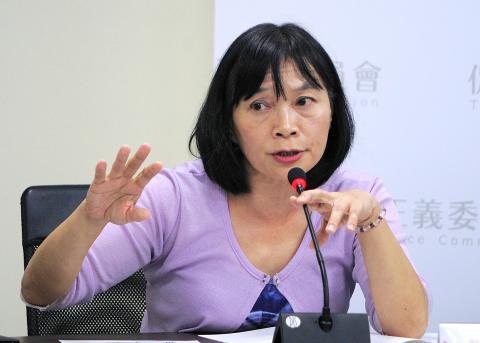A decision about the fate of the Chiang Kai-shek Memorial Hall in Taipei would be made before early next year, Transitional Justice Commission members said yesterday.
The commission would also consider options for transitioning the Cihu Mausoleum (慈湖陵寢), where Chiang Kai-shek (蔣介石) is entombed, they told a news conference in Taipei.
The news conference had been called to announce the dates and locations of three public meetings on implementing transitional justice and a human-rights vision for the nation.

Photo: Wang Yi-song, Taipei Times
While legislation can provide recompense for the financial damages and loss to reputation suffered by victims of the White Terror era, such measures in themselves are not enough to meet the demands of justice, commission Deputy Chairman Chang Tien-chin (張天欽) said.
The commission is dedicated to recovering historical truths, removing authoritarian symbols and healing societal trauma, so it is inviting victims of political persecution or their surviving family members to the public meetings so that it can explain its goals and policies, and to hear their opinions, Chang said.
The first public meeting is to be held tomorrow at the Jingmei Human Rights Memorial and Cultural Park in Taipei’s Xindian District (新店), the commission said.
The second is scheduled for Sept. 16 at the Taichung Cultural and Creative Industries Park and the third will be at the Kaohsiung Municipal Library on Sept. 30.
The Chiang Kai-shek Memorial Hall would “certainly undergo a transition,” which the Ministry of Culture has been preparing for since last year, commission member Yang Tsui (楊翠) said.
The commission would soon begin talks on the specifics, such as uses for the site and what should be down with Chiang’s statute, she said.
The ministry is drafting amendments to the Organization Act of National Chiang Kai-shek Memorial Management Office (國立中正紀念堂管理處組織法), which would lay out the steps regarding those issues, she said.
Asked about commission’s plans for the Cihu Mausoleum, Yang said the mausoleum is “definitely on the commission’s agenda,” but it has not begun discussions about it.
Lan Yun-jo (藍芸若), the daughter of White Terror victim Lan Ming-ku (藍明谷), said it is not right that the persecutors have not been identified or that she had to live with the infamy of being the daughter of an accused communist spy for 70 years.
“My father would have been pleased to visit the memorial parks if they had imprisoned him for a dozen years instead of being shot,” she said. “Many victims are living in the shadow of history and I hope the commission would give us justice.”
Lang Ming-ku, a 32-year-old teacher in Keelung, was arrested in 1951 and executed without trial.

A preclearance service to facilitate entry for people traveling to select airports in Japan would be available from Thursday next week to Feb. 25 at Taiwan Taoyuan International Airport, Taoyuan International Airport Corp (TIAC) said on Tuesday. The service was first made available to Taiwanese travelers throughout the winter vacation of 2024 and during the Lunar New Year holiday. In addition to flights to the Japanese cities of Hakodate, Asahikawa, Akita, Sendai, Niigata, Okayama, Takamatsu, Kumamoto and Kagoshima, the service would be available to travelers to Kobe and Oita. The service can be accessed by passengers of 15 flight routes operated by

Alain Robert, known as the "French Spider-Man," praised Alex Honnold as exceptionally well-prepared after the US climber completed a free solo ascent of Taipei 101 yesterday. Robert said Honnold's ascent of the 508m-tall skyscraper in just more than one-and-a-half hours without using safety ropes or equipment was a remarkable achievement. "This is my life," he said in an interview conducted in French, adding that he liked the feeling of being "on the edge of danger." The 63-year-old Frenchman climbed Taipei 101 using ropes in December 2004, taking about four hours to reach the top. On a one-to-10 scale of difficulty, Robert said Taipei 101

Taiwanese and US defense groups are collaborating to introduce deployable, semi-autonomous manufacturing systems for drones and components in a boost to the nation’s supply chain resilience. Taiwan’s G-Tech Optroelectronics Corp subsidiary GTOC and the US’ Aerkomm Inc on Friday announced an agreement with fellow US-based Firestorm Lab to adopt the latter’s xCell, a technology featuring 3D printers fitted in 6.1m container units. The systems enable aerial platforms and parts to be produced in high volumes from dispersed nodes capable of rapid redeployment, to minimize the risk of enemy strikes and to meet field requirements, they said. Firestorm chief technology officer Ian Muceus said

MORE FALL: An investigation into one of Xi’s key cronies, part of a broader ‘anti-corruption’ drive, indicates that he might have a deep distrust in the military, an expert said China’s latest military purge underscores systemic risks in its shift from collective leadership to sole rule under Chinese President Xi Jinping (習近平), and could disrupt its chain of command and military capabilities, a national security official said yesterday. If decisionmaking within the Chinese Communist Party has become “irrational” under one-man rule, the Taiwan Strait and the regional situation must be approached with extreme caution, given unforeseen risks, they added. The anonymous official made the remarks as China’s Central Military Commission Vice Chairman Zhang Youxia (張又俠) and Joint Staff Department Chief of Staff Liu Zhenli (劉振立) were reportedly being investigated for suspected “serious